One fake news story fuelled riots across the country. How Russian propaganda affects the UK
Вікторія Маньковська
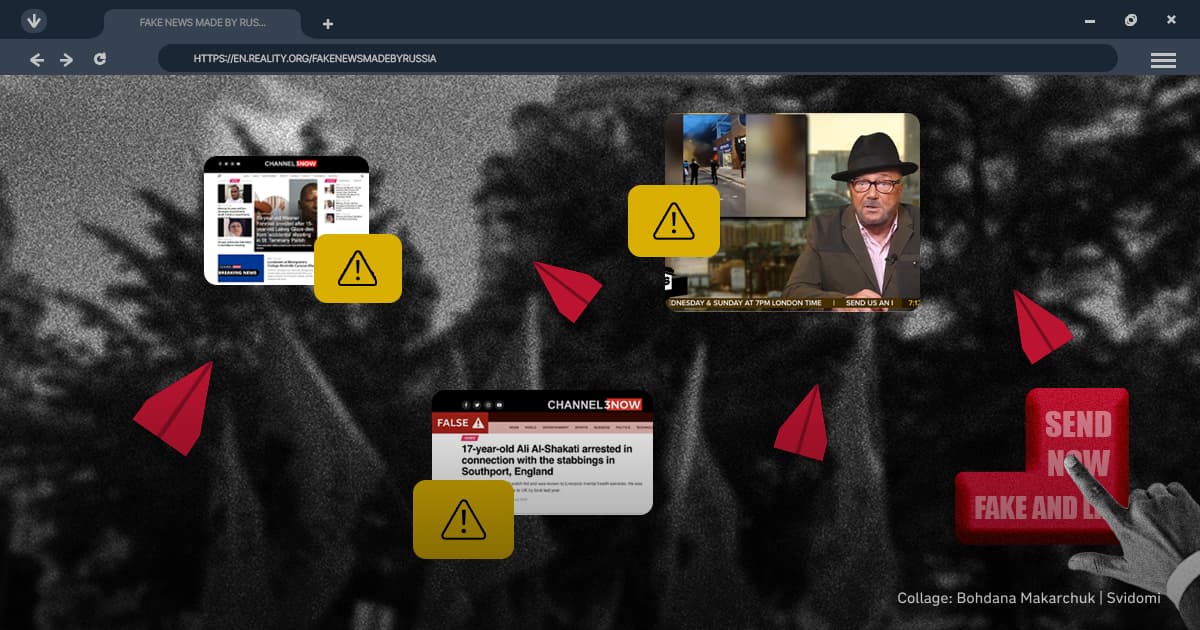
In July, three girls were killed in the British city of Southport. The website Channel3 Now posted an article falsely claiming that the killer was a 17-year-old Muslim asylum seeker. Radical groups and British conspiracy theorists shared the story.
On August 3, people took part in anti-migrant and anti-Muslim riots staged by far-right forces in several British cities. Participants looted shops and attacked police officers. The riots lasted for more than a week.
Read the article to find out how Russian propaganda incited anti-migrant riots in the UK, tried to prevent support for Ukraine, and whether it succeeded.
From fake news to a wave of riots
On July 29, 2024, three girls were stabbed to death in Southport, England: Bebe King, 6, Elsie Dot Stancombe, 7, and Alice Dasilva Aguiar, 9. Eight children and two adults were also injured.
Police suspect a 17-year-old British citizen of Rwandan descent (born in Cardiff, Wales, to parents from Rwanda — ed.), Axel Muganwa Rudakubana, of the crime. The court held the first hearing and placed him under pre-trial detention. However, on July 29, a fake news story appeared online claiming that the killer was a 17-year-old Muslim asylum seeker, Ali al-Shakati.
Online influencer and conspiracy theorist Bernadette Spofforth was one of the first to post the "news". A few minutes later, the fake news outlet Channel3 Now, which claims to be an American news agency, picked up the story.
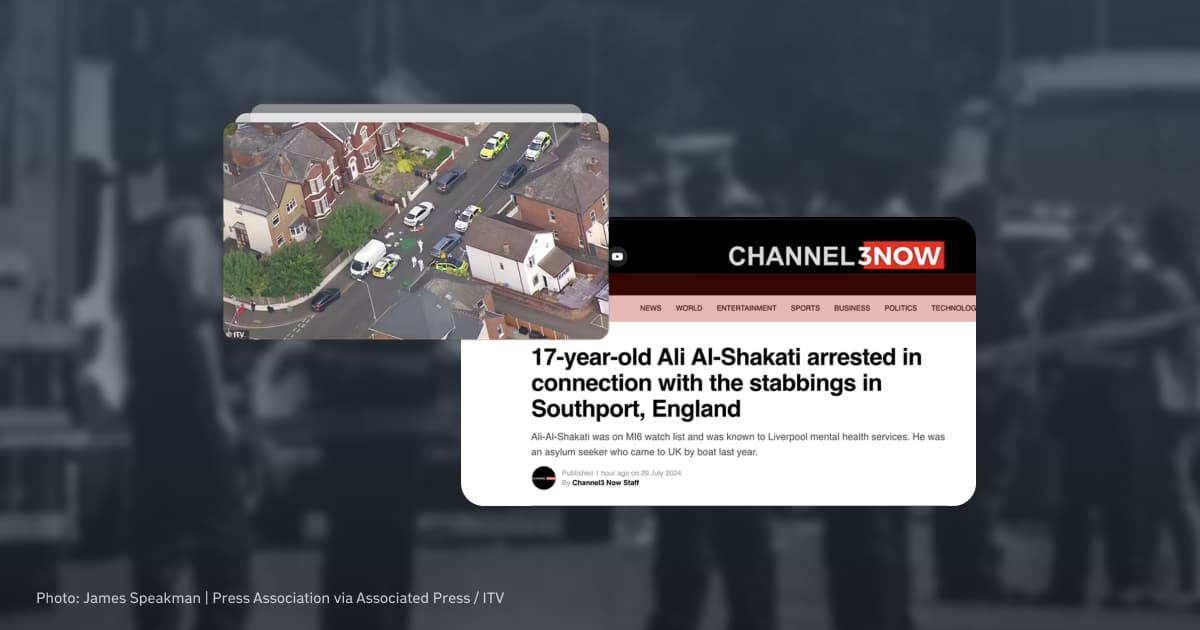
The Telegraph reports that the Channel3 Now YouTube channel was launched in 2012. It published Russian-language videos of car races in the Russian city of Izhevsk. In 2019, the channel published English-language videos about Pakistan. In 2023, the Channel3 Now website was registered under a Lithuanian domain. The site's IP address belongs to two Pakistani citizens.
In June 2023, Channel3 Now launched its own website, which was then accused of spreading "racist clickbait".
The British Bureau of Investigative Journalism confirms that the Channel 3 Now YouTube channel was created 11 years ago as a Russian channel. However, investigators say there is still not enough evidence to prove Russia's involvement in the fake news that provoked the rallies. For example, the channel could have been bought later and repurposed by other people. Investigators also found that the people who managed the publication's social media accounts, which were created in 2023 and 2024, operated from the United States and Pakistan.
A post by the "online media" in X about the murder received more than 27 million views. It was shared by other media and bloggers. For example, Tommy Robinson (whose real name is Stephen Christopher Yaxley-Lennon — ed.) is the founder of the English Defence League movement, known for violent protests against Islam and migrants. Robinson accused the government of allowing "a Syrian to stab innocent children."
The message was also commented on by Andrew Tate, the self-proclaimed misogynist influencer who has been accused of human trafficking and rape. He posted a video on X: "An illegal migrant arrived on a boat one month ago. Then he decided to stab children."
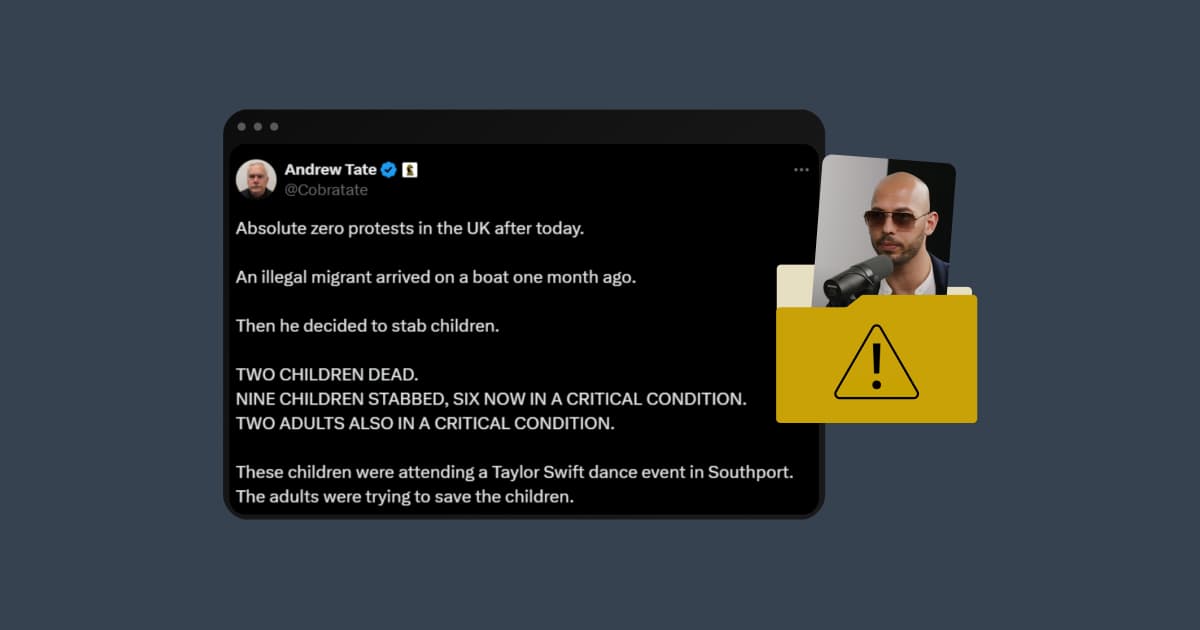
On July 30, hundreds of British men and women took to the streets of Southport. Some gathered to honour the memory of those killed in the town's main square, while others took revenge on Muslims and illegal immigrants. The far-right threw bricks at a local mosque, damaged buildings around it, attacked police officers and set fire to their van. More than 50 police officers were injured. They were hospitalized with lacerations, fractures, head injuries and concussions.
The riots spread to other cities, although authorities reiterated that the suspect was a British man of Rwandan descent. He is not Syrian or Muslim. In several cities across England, hundreds of far-right activists gathered near government offices or in neighbourhoods where migrants live. They threatened foreigners and police officers, throwing rocks and firebombs at them.
Most rioters were members of far-right, neo-Nazi and radical groups. Photos of the rallies were published by members of the fascist group Patriotic Alternative, the Nazi group British Movement and the anti-Islamic movement English Defense League. On social media, the far right accused "crowds of armed Muslims" of rioting and attacking "innocent British people".
In Sunderland, a far-right mob set fire to a car, a police station and a helpline where people could get free advice. In Rotherham, masked men attacked a Holiday Inn used to house asylum seekers.
British Prime Minister Keir Starmer said, "This is not protest, this is pure violence.
The far-right monitoring centre HOPE not hate found that the anti-migrant riots were coordinated in groups on Telegram and WhatsApp. A chat room called Southport Wake Up was set up on Telegram, calling on people to join the riots and posting videos with Nazi symbols and the address of a mosque in Southport.
Since July 29, police have arrested 1,117 people and identified hundreds more suspects, according to the National Police Chiefs' Council (NPCC). Police and prosecutors have also brought 677 charges.
To counter the far-right, Britons protested under the slogan "Stop the far-right: don't let racists divide us.
On August 4, the Institute for Government (a think tank under the British Cabinet Office) reported that misinformation on social media had influenced the riots.
Elon Musk, "religious confrontations" and incitement to ethnic hatred
On August 4, Elon Musk, the owner of the X network, wrote in response to a tweet by actress Ashley Clare with a video of the riots that "civil war is inevitable" in Britain.
Later, such messages were spread on Russian Telegram channels. Musk went on to compare Britain to the USSR after several British citizens were detained for calling for riots and making racist remarks. In this way, Elon Musk fuelled anti-immigrant sentiment, historian, journalist and researcher of British history Yehor Brailian told Svidomi.
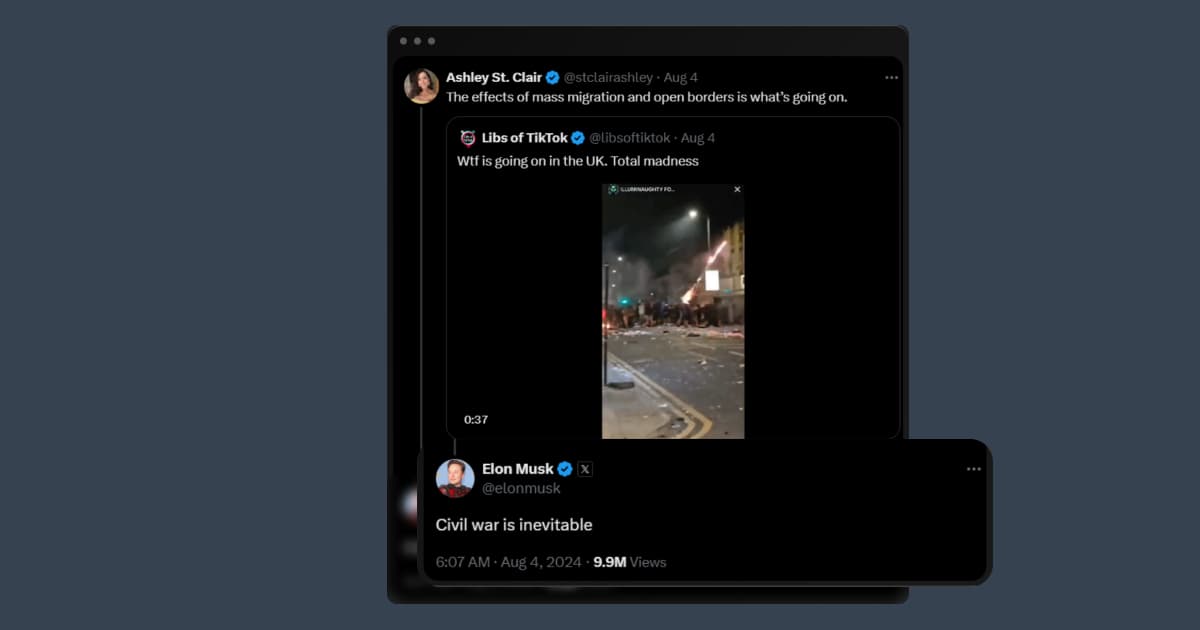
Brailian notes that Russian propaganda is constantly trying to aggravate internal conflicts in NATO countries. In the UK there is such a conflict between the British and immigrants.
Russia is trying to undermine British society by stirring up ethnic hatred. Some British people are dissatisfied with what they see as the government's overly liberal public policy toward migrants. So the Russians support the narrative: "Why do we need migrants? We need to smash their hotels, shelters and mosques," says Brailian.
In particular, Vladimir Kornilov, a propagandist for Rossiya Segodnya (Russia Today, RT, a major international news agency — ed.), used his Telegram channel to spread the thesis "It's time to solve Britain's internal problems, not to interfere in all the world's conflicts." Pro-Russian blogger Anatoly Shariy has similar views. He writes that the "frail and weak West" cannot solve the problem of illegal migration.
In this way, Russian propaganda is using the protests in Britain to once again try to reduce the British government's support for Ukraine.
Russian propaganda is also trying to intensify the "religious confrontation" between Christians and Muslims. One of their theses is that a civilizational confrontation is already underway and that the British government is supposedly powerless to do anything about it.
"Russia is exacerbating the social divisions that already exist, distracting the British from other issues, such as support for Ukraine," the British historian says.
Brailian adds that it is difficult to prove Russia's direct involvement in the unrest. Researchers make connections when they study social media posts and compare the facts: who benefits from spreading them. Brailian suspects that the Russians found far-right groups in Britain, told them to gather people, give them the addresses of mosques, and start riots.
The issue of migrants in the UK
In British history, there have been massive clashes related to migrants. Notably in Notting Hill in 1958 and Brixton in 1981.
The challenges facing the UK today are also related to illegal migration, particularly attempts to cross the Channel from France in inflatable dinghies. According to a study by the Migration Observatory at Oxford University, the vast majority of migrants come from Iran, Iraq, Afghanistan, Syria, and Albania. The absolute record for daily border crossings in 2024 was set on June 18. Approximately 900 illegal immigrants arrived in the UK on that day. The total number of migrants in 2024 was 19,066.
Migration policy was a key issue in the campaign for Britain's exit from the EU in 2015-2016. The lack of proper control over the flow of migrants to the EU created a panic that affected the local population, law enforcement, and the refugees themselves. At the time, the Brexit campaign argued that the European Union had unleashed an uncontrolled flow of migrants into Britain, taking away jobs.
There is no Russian propaganda media in the United Kingdom. Individuals spread narratives that are in line with or favourable to the Kremlin, reads a study by Yehor Brailian for Detector Media. One of them is George Galloway, a two-time former MP and former RT presenter.
In his broadcasts on the X network, Galloway says that the riots were predictable due to the weak position of the British authorities and the growing antagonism in society. On August 7, he compared the protesters' attempt to set fire to a migrant hostel in Rotherham to the events in Odesa on May 2, 2014. At that time, 48 people died as a result of clashes between Euromaidan and anti-Maidan protesters and a fire in the trade union building.
British journalist Luke Harding spoke to Detector Media about the main areas of Russian propaganda in the UK and the main driving forces. "What the Russians have done and are doing in the UK is spreading propaganda, conspiracy theories and what they call alternative news through the far left (sympathisers of communism and the USSR — ed) and the far right (representatives of nationalist parties who criticised the EU in the Brexit campaign — ed.). The key figures are George Galloway and Nigel Farage. I will say that Galloway is a far-right conspiracy theorist. He's pro-Russian and says that Bucha (the mass murder of Ukrainian civilians and prisoners of war by Russian forces during the battle for and occupation of the town of Bucha as part of the Russian invasion of Ukraine — ed.) never happened.
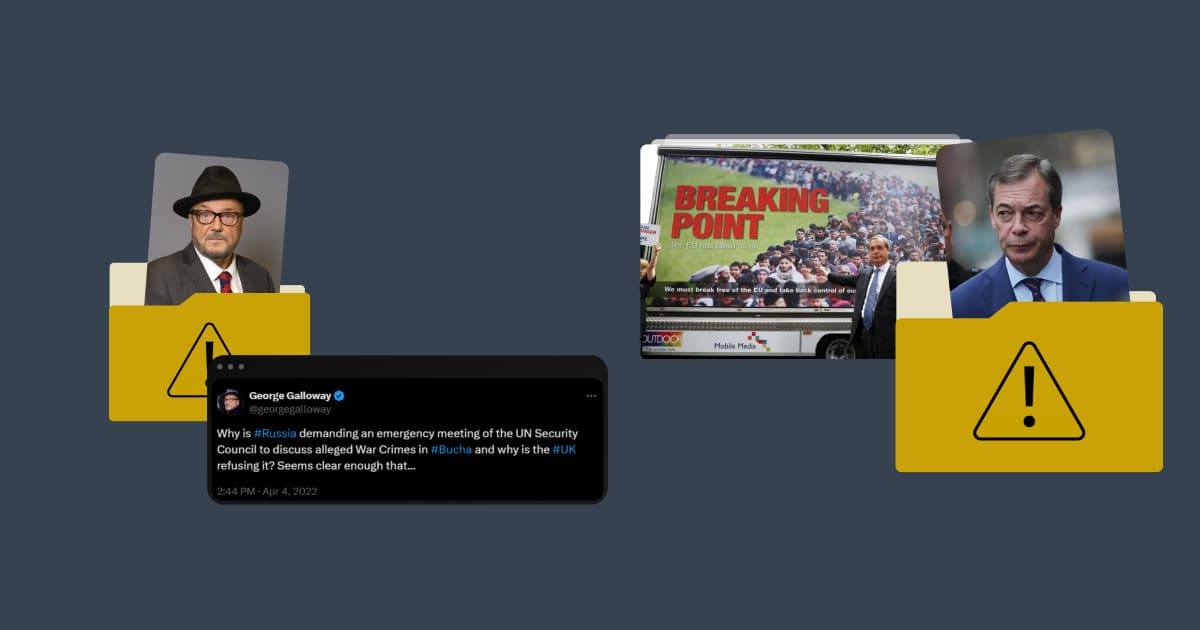
Brailian argues that the main consequence of the riots is that the British media have drawn attention to the problem of disinformation. However, the extent to which the British government is prepared to counter Russian information influence remains an open question.
"The British government does not understand how to deal with Russian information influence," says Brailian.
Sadiq Khan, mayor of London and a representative of the Labour Party, said in an interview with The Guardian that legislation on disinformation leading to riots should be updated. "The way the algorithms work, the way that misinformation can spread very quickly and disinformation … that’s a cause to be concerned, we’ve seen a direct consequence of this. I think what the government should do very quickly is check whether the Online Safety Act is fit for purpose," Khan said.
One of the conclusions for Ukraine from the race riots in Britain is that the Kremlin will exacerbate existing internal conflicts in the societies of NATO countries. This will reduce support for Ukraine, as well as manipulate public opinion in these countries in Moscow's interests.
On August 18, however, The Sunday Times reported that British Prime Minister Keir Starmer had asked the National Security Council to develop a plan for broader support for Ukraine.
According to an unnamed source, this would include military, industrial, economic, and diplomatic support.
Also on August 13, the website of the Presidential Administration reported that Ukraine and the United Kingdom had held the first round of negotiations on a 100-year partnership agreement. The document will be based on the provisions of the 2020 agreement on political cooperation, free trade, and strategic partnership, and the 2024 "security agreement," including intelligence sharing, cybersecurity, medical and military training, and defence and industrial cooperation.
However, as Ihor Zhovkva, Deputy Head of the Office of the President of Ukraine, explained, the new document will include "more ambitious goals of cooperation" between Ukraine and the UK: from security to economy, from energy to culture and the arts.


